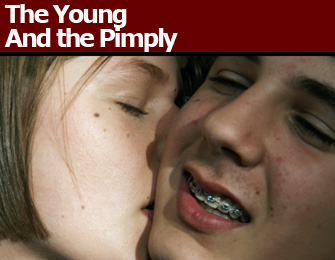
Opening shot: a tight close-up of two mouths engaged in a long and rather complicated looking French kiss. In any other movie the image would be charged with romanticism, even eroticism, but in Riad Sattouf’s new film Les Beaux Gosses, the dominant tone is one of comic horror, mixed with a strong element of suspense. As it happens, the lips of one of the kissers in question (upper lip fuzz hints that we’re dealing with an adolescent male) are ringed with a sprinkling of pus-capped pimples. As the kissing frenzy clumsily continues, the viewer is forced to contemplate the possibility of one false move triggering a sudden explosion.
Other adolescent gross-out moments (not to mention a fabulous wealth of zits) abound in Sattouf’s first cinematic outing, which enjoyed critical acclaim at this year’s Cannes Festival’s Quinzaine des Réalisateurs series. Truth be told, the protagonists of Les Beaux Gosses (which translates into English as “The Good-looking Kids”) comprise the most striking ensemble of teenage geeks, goofs and ugly ducklings to hit the screen in a long time.
The protagonist, Hervé (Vincent Lacoste), is a messy-haired misfit who lives a banal teenage existence in the French city of Rennes. Most of the film’s action plays out at Hervé’s equally banal public school where, wearing the same unwashed argyle sweater day after day, he and a multicultural crew of classmates shuffle to and from classrooms presided over by a wacky staff of teachers. The 14-year-old’s brief moments of reprieve from classes are spent being beaten up by bullies or trading monosyllabic barbs with a trio of motley pals whose favorite pastime consists of lusting after members of the opposite sex who won’t give them the time of day.
Outside of school, life is considerably more stimulating. Hervé hangs out with his best friend Camel (Anthony Sonigo), a scrawny heavy-metal fiend (with a mullet to end all mullets) of North African extraction, with whom he dons socks and jacks off while spying on fornicating neighbors. He also clocks in a lot of time in his bedroom where, urged on by bra models from 1980s’ mail-order underwear catalogs (published in the days before nipples were airbrushed out), he vigorously masturbates, much to the Oedipal delight of his perpetually green-track-suited mother (a brilliantly kooky Noémie Lvovsky), who revels in her son’s blooming masculinity.
Hervé’s raging hormones are put to the test when he (somewhat unbelievably) finds himself the object of the affections of the school hottie, Aurore (Alice Trémolière), an articulate, clear-skinned beauty with a shoplifting habit whose interest in Hervé causes his emotions as well as his member to spin out of control (many embarrassing public hard-ons as well as a premature ejaculation ensue). Their resulting relationship, while hardly a great romance, contains some touching moments of truth, tempered with a heavy dose of hilarity, as Hervé struggles to come to terms with his emerging sexual self.
There is not much of a narrative in Les Beaux Gosses. The director seems content to seamlessly string together a series of entertaining vignettes, with a refreshing absence of the sentimentality, drama and/or psychological insight found in most classic coming-of-age stories.
That Sattouf – who also wrote the screenplay and contributed to the quirky soundtrack – is a highly regarded comic-book artist not only explains the great sensitivity shown toward teens, but also accounts for the film’s episodic nature, quick pacing and boldly drawn characterizations that practically pop off the screen. The supporting characters are particularly cartoon-like. While lacking in depth, they are nonetheless highly colorful and immediately memorable figures whose physical traits (most notably some really hideous haircuts) provoke just as much laughter as the dialogue.
Particularly delicious are Hervé’s teachers, including an effetely Byronic English prof whose published book of poetry is entitled Les Mauvaises Odeurs (Bad Smells) and a vixenish principal (Emmanuelle Devos in a juicy cameo) who brings order to the class with a well-placed kick of her stiletto boots.
Sight gags also abound; one of the most recurring involves the school vending machine, which rather fetishistically hawks only bananas. Indeed, the film’s highly charged visuals offset the fact that much of the youths’ dialogue is mumbled or spoken in slang that will leave even fluent-French speakers at something of a linguistic loss.
What ultimately distinguishes Les Beaux Gosses from other contemporary teen fare is its considerable charm coupled with a lingering sense of innocence. The kids in this film aren’t snorting crack, getting pregnant or shot up in gang wars, or nursing feelings of nihilism. They’re not interested in designer duds or their brilliant careers. Despite the awkward and humiliating moments Hervé and his crew confront in their day-to-day lives, they’re really just content to be nerdy adolescents, and therein lies the delight of the film. In the end, Les Beaux Gosses will leave you laughing – but also feeling distinctly relieved that your Clearasil years are far behind you.
Favorite
